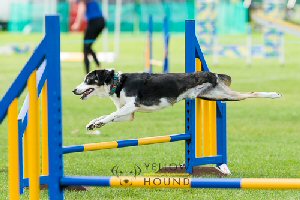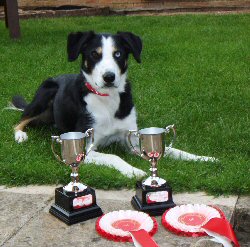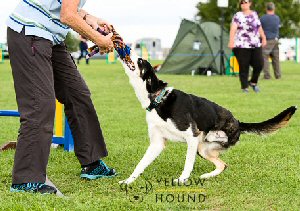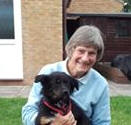On his return to
agility...
 Milo
came to Heather Smith at the age of 21 months as a ‘high drive’ collie with no boundaries.
He was considered out of control and aggressive. It's not an
exaggeration to say that Agility was his saving grace. The past few years with
him have been frustrating, rewarding, annoying, amusing, but never, ever boring.
This is their true story - one not just of speed but courage in the face of
adversity, commitment and perseverance. Thank you to their trainers Bobbie Boax
and Morag Harris for their input. Milo
came to Heather Smith at the age of 21 months as a ‘high drive’ collie with no boundaries.
He was considered out of control and aggressive. It's not an
exaggeration to say that Agility was his saving grace. The past few years with
him have been frustrating, rewarding, annoying, amusing, but never, ever boring.
This is their true story - one not just of speed but courage in the face of
adversity, commitment and perseverance. Thank you to their trainers Bobbie Boax
and Morag Harris for their input.
Milo was taken to my
local vets to be put to sleep as he was impossible to train. One of the nurses
fostered him which is where I saw him six weeks later. I was looking for a dog I
could introduce to agility. His potential was immediately obvious as he bounced
around the furniture!
At home he was
constantly on the go. On rare occasions, he would lie beside me for fuss and
attention and but if the phone rang or the door bell should ring... He
lacked socialisation and struggled with self-control so we got through lots of
treats and cheese in a tube. Milo very quickly learnt the basic agility skills.
He was all speed and enthusiasm and he just loved it.
Bobbie
Boax, one of Milo's original trainers remembers the first time she saw him.
She told me,
'He had agility dog written all over him. When he came to class, he was
unruly, noisy but above all enthusiastic.
Heather's patience with him has been amazing and I truly believe he could
never have found a better home. It wasn't all about teaching him agility but teaching him how
to cope with the other things in every day life.'
 He went from strength to
strength in his agility training unless there was a tunnel at the end of a
contact and then it was a case of fingers crossed. He made good progress in
Steeplechase achieving Senior level but his impulsive, enthusiastic approach
made his contacts very unreliable so progress in Agility was slow. In the ring,
he was either amazing or a disaster but it was never dull. He always had fun. He went from strength to
strength in his agility training unless there was a tunnel at the end of a
contact and then it was a case of fingers crossed. He made good progress in
Steeplechase achieving Senior level but his impulsive, enthusiastic approach
made his contacts very unreliable so progress in Agility was slow. In the ring,
he was either amazing or a disaster but it was never dull. He always had fun.
Looking
for an answer...
In July 2016, Milo went slightly lame on his left hind leg. It was initially
thought to be a cruciate problem. After extensive tests, x-rays etc., however,
it was ascertained that this was not the case.
One of my trainers
Bobbie remembers seeing us at a local show when I had brought Milo out for the
afternoon. She told me later that she had to walk away or stand there and cry.
All his spark had gone. He certainly was not the Milo we knew and loved.
For the next nine months
I travelled miles, tried a wide variety of therapies and treatments and maxed
out the insurance in the search of diagnosis, whilst he steadily became more
lame and withdrawn. Eventually, a second round of x-rays showed the femur just
above the knee was like honeycomb. This meant cancer and a full leg amputation
was the only option.
The surgery was in late
May and the histology report found cancer of the ‘peripheral nerve sheath’. It
was a locally aggressive cancer, but not normally known to spread. With the full
leg amputation there was a good chance it would not recur.
It is difficult to tell
whether the cancer affected his behaviour as Milo was given pain relief from
August 2016. A variety of medications were tried over the subsequent months. I
think the side effects of these and increasing levels of pain contributed more
to any behavioural changes. These changes were mainly to his temperament. He
became very subdued, flat and quiet. His eyes were sad.
 Rehab Rehab
Throughout this long period of lameness, Milo enjoyed going into the
agility training arena just to run around and play tuggy, avoiding all the
equipment. He was allowed to potter around the arena for some safe off lead
time. He certainly enjoyed this time.
Prior to his surgery,
Milo was almost a tri-paw dog, bearing no weight on his left hind leg, so the
rehab has been relatively quick and straightforward. A week after his amputation
and the change in him was unbelievable.
About a month later, he tried some
gentle training, running through wings in big looping circles learning to adjust
his weight and gain his balance. This has progressed through poles on the
ground, at an angle and on to toy height and always tunnels – OMG he loves them!
His eyes came alive and his whole demeanour changed. The culmination was his
first run in Casual Steeplechase (NFC) at Teejay in mid-August 2017.
I think it is unlikely that we will change the height from Toy,
but the A-frame at lower height is definitely beckoning...
Where do we go from here?
Since returning to agility,
it is great to have the 'vintage' Milo back - fast, feisty and happy. Gone are
the months of pain and medication which made him so flat and listless.
Several weeks on, Milo
now needs to be challenged in training to ‘steady’ enough to master the balance
and weight adjustments needed to include more advanced moves leading to more
intricate courses. I also need to improve my timing, especially of verbal
commands! For how long he will be able to do this is a big question but for now
Milo has returned to his fun, bright loving self so long may it continue.
 About the author... About the author...
Heather Smith has had dogs for nearly 30 years. Her first dog was a rescued farm collie pup
that enjoyed long walks on Dartmoor.
Since then, she's had five rescue dogs - all mongrels.
Her
interest in agility began about 20 years ago but work and family commitments
meant that she only started competing in 2012.
Photos of Milo at competitions:
Yellow
Hound Photography
First published:13 September 2017
|